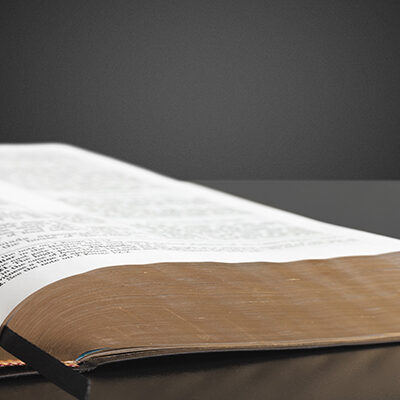How Not to Pray
The concept of using mindless, rote, memorized prayers will clearly not build a relationship with God. However, God does tell us to be persistent in prayer. How does one develop a true, heartfelt, deep, prayer life to get closer to God while considering both these factors? This is one big issue that each person should think about. Consider what Jesus instructed us:
Matthew 6:7-8, “And when you pray, do not use vain repetitions as the heathen do. For they think that they will be heard for their many words.
“Therefore do not be like them. For your Father knows the things you have need of before you ask Him.” (NKJV)
Jesus was explaining that what the worldly pagans did while worshiping their gods was not what God desires. We should obviously avoid those kinds of pagan-like practices. However, each of us should ask, “How can I keep my prayers spontaneous and heartfelt?” Many of us use prayer lists and must work on not letting that list push us in the rote-prayer direction. One thing that could help is to learn more about the people we are praying for, if possible.
Those who wish to build a strong relationship with the true God must be persistent even when we have to wait a long time for an answer. Yet one must not become rote in the asking. How can we prevent that from happening?
Luke 18:7-8, “Shall God not avenge His own elect who cry out day and night to Him, though He bears long with them?
“I tell you that He will avenge them speedily. Nevertheless, when the Son of Man comes, will He really find faith on the earth?”
One distressing reality is that it seems to be prophesied that in the end of the age many will lose faith and give up on the value of prayer! They will no longer believe in a God who can intervene. Is this the future of many of us? We hope not!
When we don’t get answers to our requests in a timely manner, appreciate that God is playing the long game. But we can always express our true feelings with God. David certainly did!
Psalm 10:1-2, “Why do You stand afar off, O LORD? Why do You hide in times of trouble?
“The wicked in his pride persecutes the poor; Let them be caught in the plots which they have devised.”
David is complaining in prayer that it seems that God is avoiding him. He is asking why God is allowing the evil ones to succeed. David is boldly honest with God about how he feels.
Psalm 88:13-15, “But to You I have cried out, O LORD, And in the morning my prayer comes before You.
“LORD, why do You cast off my soul? Why do You hide Your face from me?
“I have been afflicted and ready to die from my youth; I suffer Your terrors; I am distraught.”
David normally ended his prayers with praises, even after pleading with God to save him from his troubles. We will look at one such prayer:
Psalm 89:1-3, “I will sing of the mercies of the LORD forever; With my mouth will I make known Your faithfulness to all generations.
“For I have said, Mercy shall be built up forever; Your faithfulness You shall establish in the very heavens.
“I have made a covenant with My chosen, I have sworn to My servant David:”
David goes on to praise God above all for everything He promised.
Humbling Ourselves and Honoring God
Paul the Apostle accepted God’s “NO” answer because he realized it would keep him humble. He learned to appreciate humility. Humility allowed God’s power and inspiration to flow into Paul in greater amounts.
2 Corinthians 12:5, 7-9, “Of such a one I will boast; yet of myself I will not boast, except in my infirmities…lest anyone should think of me above what he sees me to be or hears from me.
“And lest I should be exalted above measure by the abundance of the revelations, a thorn in the flesh was given to me, a messenger of Satan to buffet me, lest I be exalted above measure.
“…I pleaded with the Lord three times that it might depart from me.
“And He said to me, ‘My grace is sufficient for you, for My strength is made perfect in weakness.’ Therefore most gladly I will rather boast in my infirmities, that the power of Christ may rest upon me.”
Paul’s prayer-power was greatest when he humbled himself. Likewise, our prayer-power will be stronger when we follow Paul’s example of humility.
Another example of the power of prayer is based on King Hezekiah’s prayer while the frightening Assyrian Army was besieging Jerusalem. The Assyrians bragged that the gods of all the pagan nations they had conquered could not save them, so why should the Israelites assume their God was any stronger?
Isaiah 37:29-33, “Because your rage against Me and your tumult have come up to My ears, Therefore I will put My hook in your nose And My bridle in your lips, And I will turn you back by the way which you came…”
“Therefore thus says the LORD concerning the king of Assyria: ‘He shall not come into this city, nor shoot an arrow there, nor come before it with shield, nor build a siege mound against it.’”
Hezekiah’s prayer emphasized the Assyrian’s blasphemy of God’s power and greatness, not how good the people of Jerusalem were at that time. God answered by causing the Assyrian army to simply die. They never woke up again. The evil king had to return home without his 185,000 troops because he had challenged the God of Israel. He was soon assassinated.
In a similar attitude Moses prayed, asking God to spare Israel after they rejected His leadership, displayed their lack of trust in Him and refused to enter the promised land. He based his request on maintaining God’s reputation, not on the goodness of the people.
Numbers 14:14-16, “And they will tell it to the inhabitants of this land. They have heard that You, LORD, are among these people; that You, LORD, are seen face to face and Your cloud stands above them, and You go before them in a pillar of cloud by day and in a pillar of fire by night.
“Now if You kill these people as one man, then the nations which have heard of Your fame will speak, saying,
“‘Because the LORD was not able to bring this people to the land which He swore to give them, therefore He killed them in the wilderness.’”
When we pray for America, we should base our prayers on God’s greatness, as the nation He has blessed and chosen; certainly not on the goodness of the American people. We do not want God to give us the leadership we deserve.
Closeness To God Strengthens Prayers
Obeying God, being humble and praying regularly are like force multipliers. By maintaining closeness and obedience, prayers will gain more strength.
The disciples, after casting out many demons, found one they could not handle. Christ gave them this advice:
Mark 9:28-29, “And when He had come into the house, His disciples asked Him privately, ‘Why could we not cast it out?’
“So He said to them, ‘This kind can come out by nothing but prayer and fasting.’”
The more we pray daily, and fast occasionally, the more power our prayers will have.
James 5:16, “Confess your trespasses to one another, and pray for one another, that you may be healed. The effective, fervent prayer of a righteous man avails much.”
God expects some level of true trust from us to gain His ear in prayer.
Mark 9:23-24, “Jesus said to him, ‘If you can believe, all things are possible to him who believes.’
“Immediately the father of the child cried out and said with tears, ‘Lord, I believe; help my unbelief!’”
If we need more faith we can ask God for it, and just like this father’s request, He will fill it. If we need more wisdom to know what to pray for, we can ask for it.
James 1:6-8, “But let him ask in faith, with no doubting, for he who doubts is like a wave of the sea driven and tossed by the wind.
“For let not that man suppose that he will receive anything from the Lord;
“He is a double-minded man, unstable in all his ways.”
Romans 8:26-27, “Likewise the Spirit also helps in our weaknesses. For we do not know what we should pray for as we ought, but the Spirit Himself makes intercession for us with groaning which cannot be uttered.
“Now He who searches the hearts knows what the mind of the Spirit is, because He makes intercession for the saints according to the will of God.”
This is one of the most intriguing verses on prayer in the Bible. The “groanings” mentioned are not mindless gibberish (see I Corinthians 14:22-23). Let us strive for this even deeper bond with God through heartfelt prayer.
Paul was so close to God that God’s Spirit would help him to pray effectively. Can any of us hope to attain this level of bonding with God? If it is in scripture, then it is possible to achieve.
“Now this is the confidence that we have in Him, that if we ask anything according to His will, He hears us” (1 John 5:14).







